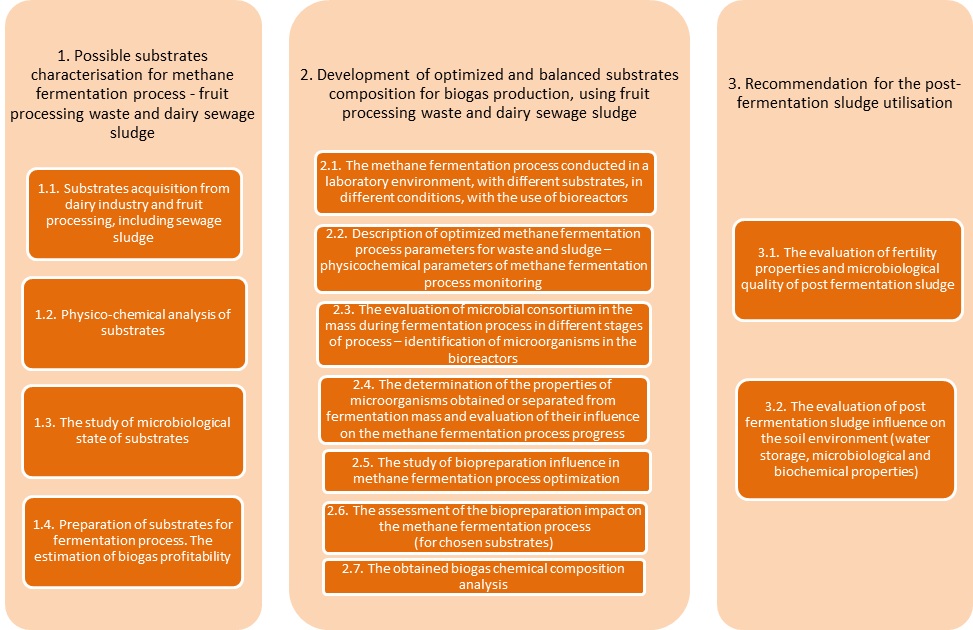The structure of the project includes three main stages of work, in which are listed the specific research tasks:
Stage I – The characterization of the possible substrates in the methane fermentation process
This stage includes: substrate aquisition; complex research on the given wastes – physicochemical analysis (dry matter, reaction, general nitrogen and organic carbon contents, P, K, Ca, Mg contents, heavy metals contents: Cd, Zn, Cu, Pb, Ni, Cr, Hg), microbial analysis (the total number of fungi and bacteria, the substrate sanitary evaluation, molecular identification of the microorganisms native for the waste, taking under particular consideration the properties of the isolated microorganisms) and a study of biogas profitability for the materials provided (measuring the biogas amount and its quality, in relation to the biogas obtained from the substrates researched in the fermentation process, with the use of special bioreactors).
The characterization of the microorganisms is carried out on the grounds of their ability to metabolize carbon compounds and a special system Biolog will be employed for this task. In this identification process, molecular biology techniques will be in use, especially those based on the material gene amplification in PCR reaction with proper primers and also based on sequence analysis in a sequencer.
After a detailed analysis of the research results, proper waste proportions must be established, so they could be further neutralized in the methane fermentation process under lab conditions. As a result of scientific research, the main theoretical assumptions will be established, as well as the technical parameters for the innovative and ecological selection of the substrates which are neutralized in the fermentation process. The substrates, once properly chosen, are essential constituents for preparing an innovative biopreparation which facilitates and accelerates anaerobic waste treatment, generating large amount of biogas at the same time.
Stage II – The working out an innovative biopreparation which facilitates the optimization of methane fermentation process in particular substrates
This stage concerns mainly microbial aspects of the methane fermentation process in the given substrates, and it also refers to the interaction between microbes and to determining their properties. The research methodic includes cyclical control and monitoring of the methane fermentation process parameters, with a focus on the microorganisms living in the fermentation mass. Another important part of such research is describing the enzymatic properties of the microbes isolated from the fermentation mass, and biogas composition analysis, together with its microbial quality evaluation. The biogas research methodic includes its chemical analysis, conducted with the use of biogas analyzers. The isolated microbes will be identified by means of molecular techniques, according to their metabolic properties. Key research on the microbial diversity will be all-embracing, conducted with the use of most advanced research techniques based on microorganism identification, such as the amplification of the DNA isolated from fermentation mass in a PCR reaction, with carefully chosen primers.
Another method of microorganism characterization is connected with the metabolize of various carbon sources, using Biolog system. The next steps in this stage are:
- describing the properties of microorganisms, by means of assessing certain enzyme activity
- the selecting of the most active strains and optional introducing additional strains, from recognized microbial collections
- the selection of a suitable medium for the selected microbial strains and the development of the biopreparation production method, including microbial culture
- the description of the biopreparation influence on the methane fermentation process
Stage III – the evaluation of the possibility of the post-fermentation sludge utilization
The evaluation of these wastes influence on soil environment will be carried out in lab conditions. Quality analysis pertaining to the obtained post-fermentation sludge will include its sanitary and fertilizing properties and therefore a comprehensive assessment will be provided. Stage III will also provide an evaluation concerning the influence on soil environment, especially on microbial and soil quality indicators, controlled within the environment monitoring scheme. The research methodic is in compliance with generally accepted standards in the field of scientific procedures of this type. The ultimate result of the research is a complex and versatile evaluation of the post-fermentation sludge and recommendation for its agricultural applications.
Structure of the project:

